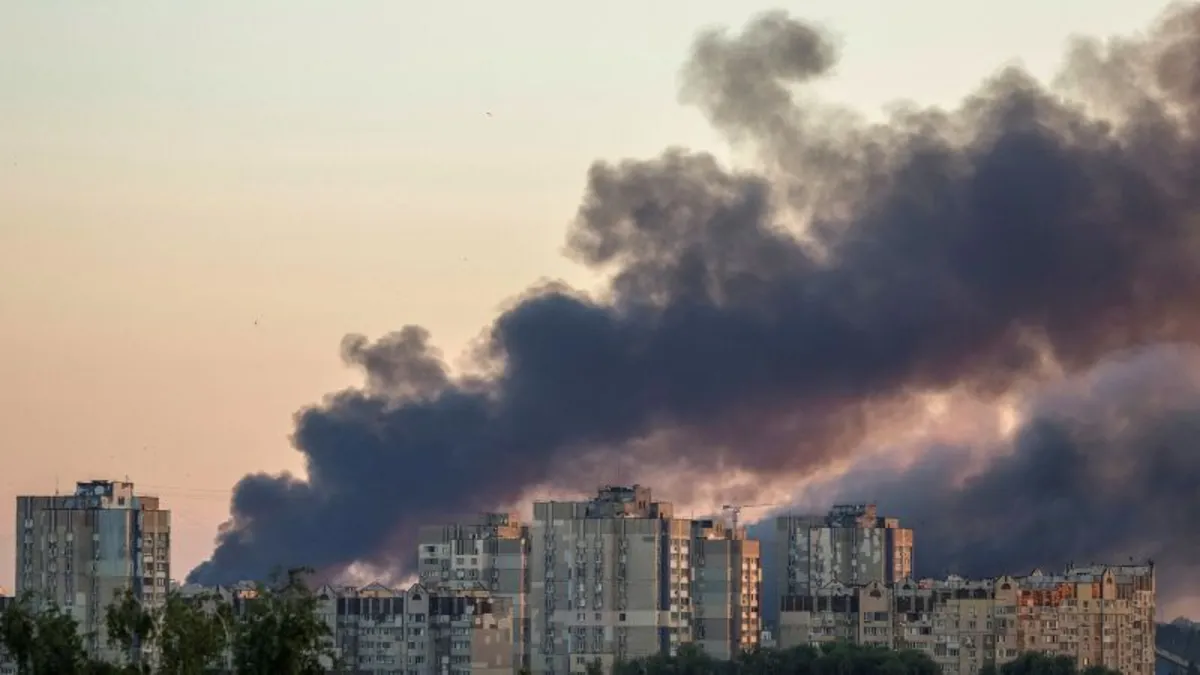
The recent decision by the Trump administration to pause certain weapons shipments to Ukraine has sparked a wide array of reactions that underscore the complexities of the ongoing conflict. While the Kremlin welcomed this move, officials in Kyiv have labeled it as “inhumane.” On Wednesday, the Pentagon announced that it would be reviewing the aid to ensure it aligns with President Trump’s “America First” agenda. This halt in military support could have dire implications for Ukraine, particularly as it includes critical missiles for Patriot air defense systems. These systems are essential in protecting millions of Ukrainian civilians from the escalating daily aerial assaults by Russia.
Ukraine faced one of its largest attacks on the night leading into Friday, enduring a harrowing 13-hour barrage that saw Russia launch a record 539 drones and 11 cruise and ballistic missiles toward the capital. The Ukrainian air force reported that it successfully intercepted a significant number of these threats. President Volodymyr Zelensky commended the military's efforts, stating, “It is critically important that our partners continue to support us in defending against ballistic missiles. Patriot systems and their missiles are true protectors of life.” This statement was clearly aimed at urging President Trump to reconsider the pause in military assistance.
Zelensky had an opportunity to address these concerns directly with Trump during a phone call on Friday. According to a readout from Zelensky’s office, the two leaders agreed to collaborate on enhancing the protection of Ukraine's airspace. The Ukrainian president emphasized the need for direct projects with the United States, highlighting the critical importance of air defense technologies amidst the ongoing conflict.
The Patriot air defense systems are unmatched in effectiveness; however, their production is limited, and the demand is surging globally. This is particularly true in regions that the Trump administration considers strategically vital, such as the Middle East and South Korea. The announcement of the pause sent shockwaves across Ukraine, with presidential adviser Mykhailo Podolyak describing it as “very strange” and “inhumane” to halt missile supplies that safeguard civilians.
Despite the alarm, the halt in aid was not entirely unexpected. Trump has previously threatened to withdraw support for Ukraine to pressure Kyiv into negotiations, and there has been no new aid announced since early January. Historically, the United States has been Ukraine's largest military supporter, covering around 40% of its military needs. However, European nations have intensified their assistance, surpassing the U.S. as the leading donor, with the German Kiel Institute reporting a total support of €72 billion ($85 billion) from Europe compared to €65 billion ($76.6 billion) from the U.S.
Experts warn that while Ukraine has diverse military needs, some can only be met by the United States. According to Daniel Byman from the Center for Strategic and International Studies (CSIS), the absence of U.S. ballistic missiles would create a significant gap in Ukraine's air defense. The frequency and severity of Russian attacks have escalated, with reports indicating that as many as 80 ballistic missiles were fired in June alone. Even with some interceptions, those that do breach defenses lead to catastrophic consequences, including civilian casualties.
The cost of each Patriot system is approximately $1.1 billion, and the missiles themselves are roughly $4 million each. Even if Ukraine had the financial resources, sourcing these systems remains a challenge. The production of Patriot missiles is not only sophisticated but also limited, with Lockheed Martin producing around 500 units per year, and plans to increase to 650 by 2027. Additionally, a significant deal for manufacturing outside the U.S. was approved last year, but deliveries are not expected for several years.
Ukraine currently operates about half a dozen Patriot batteries, but to effectively defend its airspace, estimates suggest it requires around 25. The recent pause impacts shipments that were already approved and funded, which adds urgency to the situation. According to Byman, halting these deliveries represents a detrimental shift in Ukraine's defense strategy, especially as Russian assaults continue daily.
The suspension of U.S. military aid plays into Russia’s strategy, as they believe that reduced support for Ukraine may lead to its eventual collapse or concessions. Historical patterns show that delays in U.S. aid have often accelerated Russian advances on the battlefield. The Institute for the Study of War (ISW) indicated that such pauses in assistance reinforce President Putin’s belief that he can win through attrition, outlasting Western support for Ukraine.
The absence of U.S. military aid is not merely a setback for Ukraine; it poses a potential disaster for a nation that has made immense sacrifices to defend itself against a stronger adversary. As the situation unfolds, the need for decisive and consistent support from the United States becomes increasingly critical for Ukraine's survival and resilience in the face of ongoing aggression.